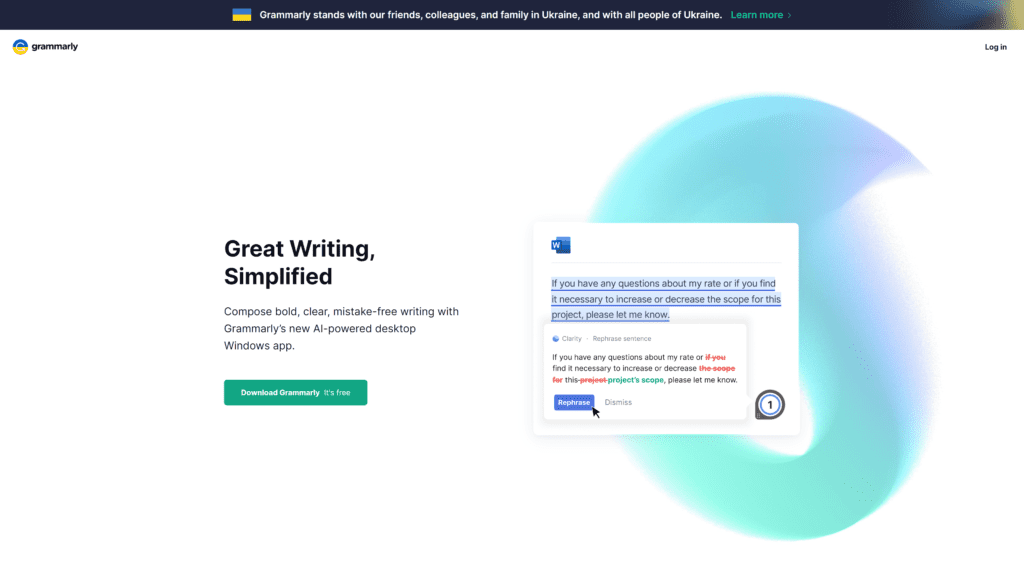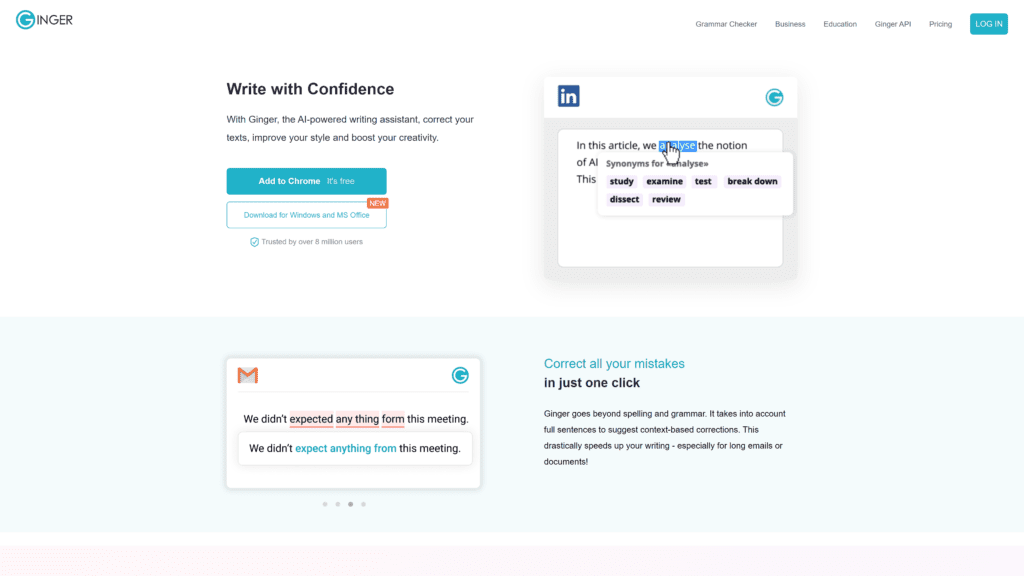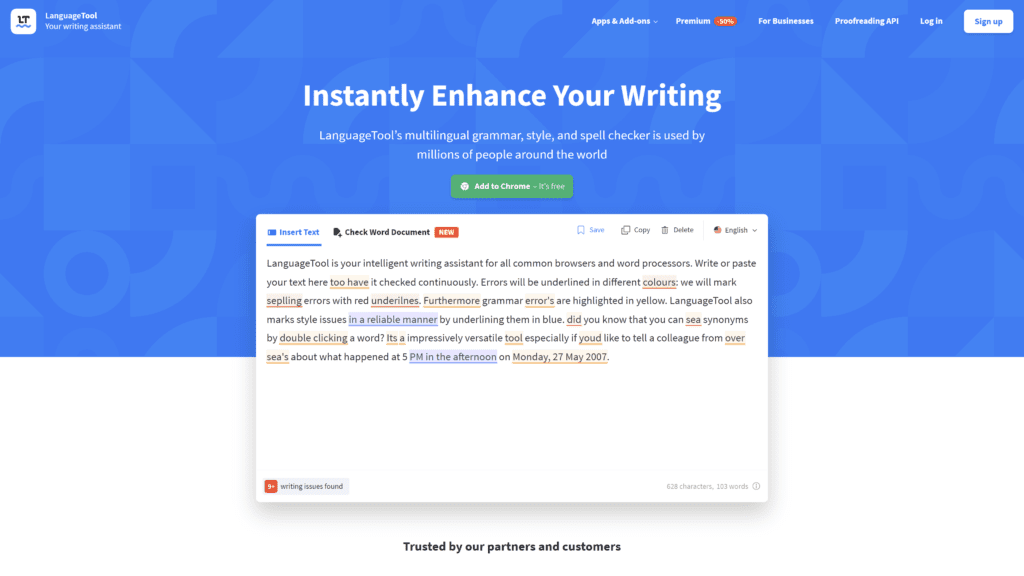
When it comes to blogging, you want to share engaging content that keeps your audience coming back.
But the content doesn’t just need to be interesting—it also needs to be easy to read.
Using editing tools ensures you’re getting your point across in the most concise way.
This list will help you find the best grammar checker to proof your written content.
The Best Grammar Checkers (Overview)
Our Top Picks
- Grammarly – our top pick overall
- ProWritingAid – our suggestion if you don’t like Grammarly
- Ginger – a powerful, yet affordable, budget alternative
Notable Mentions: Other Great Grammar Checkers
- Quillbot – best for paraphrasing
- Trinka AI – best for academic and advanced writing
- Scribens – great Grammarly alternative
Even More Options To Check Out
- LanguageTool – best for multilingual writing
- Typely – great for correcting grammar mistakes in essays
- Jetpack – interesting option for WordPress sites
Our Pick: Grammarly
Grammarly is the best grammar checker because it’s so well-known and reliable.
Users who install the browser extension can make corrections as they write to reduce time spent polishing work.
It highlights errors when writing emails, Google Docs, WordPress posts, and social media captions.
The tool has built-in dictionaries and style guides, and you can choose from languages such as:
- American English
- Australian English
- British English
- Canadian English
It’s available for Chrome, Firefox, Safari, and Edge so everyone can take advantage of the service.
Even a free plan helps you polish your writing, so there’s no reason you shouldn’t try Grammarly.
Runner-up: ProWritingAid
ProWritingAid offers countless suggestions for writers, including spelling, grammar, tone, sentence structure, and plagiarism.
However, the free version has limits, including only analyzing 500 words of text at a time.
You can break your writing into pieces to get certain corrections, but you’ll most likely want to pay for the full editing power of this tool.
The browser extension is free, so it’s a way to try out the service whether you’re writing an email, a work report, a blog post, or posting to social media.
You can also integrate the tool with your preferred writing platforms, such as Word, Google Docs, or Scrivener.
Budget Pick: Ginger
Ginger offers many of the same checks as Grammarly and ProWritingAid, but at a discount.
The free version also has more limitations than the other services, such as 350 words at a time and a certain number of monthly checks.
Since it’s an affordable tool, it’s worth paying for a plan to take advantage of the edits it suggests.
You can install the Ginger browser extension to get corrections anytime you’re typing.
The paid versions include a way to integrate the service into Word.
You can also download an app for iOS or Android, so you get corrections on your mobile device, too.
An Overview of Grammar Checkers
Grammar checkers suggest changes to spelling and punctuation, but it goes beyond that.
These tools also read your entire piece to ensure you’re using the right tone to make your point.
Using a grammar checker helps you polish your writing so it’s correct and cohesive, making readers return to your site for quality content.
What Is a Grammar Checker?
A grammar checker functions as a second set of eyes on your written content.
You can draft a blog post and then run it through a grammar tool to get corrections.
In some cases, it might be mistakes you overlooked.
Other times, it might consider your tone and give suggestions to stay on track throughout the whole piece.
Grammar checkers have built-in dictionaries, style guides, and lists of rules to check your writing.
Some tools let you toggle between languages, such as American or British English, depending on your audience.
The Different Types of Grammar Checkers
There are free and paid grammar checkers.
Free tools will give you a certain amount of corrections, but you won’t get the full picture.
It might highlight every error but only show you the edited version of the misspellings or punctuation errors.
You might have to pay for full access to see the instances of passive voice or sentence fragments.
There are also different types of grammar checkers regarding what they correct.
For example, researchers and academics will want a more professional grammar checker that follows specific style guides.
Bloggers want a well-rounded tool that helps them make their point without losing readers.
Fiction writers will want a service that doesn’t try to change their voice.
Why Are Grammar Checkers Important?
Grammar checkers catch errors you might overlook when you’re writing content.
These tools catch misspellings and grammar problems.
Though you can rely on these tools to catch major errors, it still helps to have basic knowledge about spelling and grammar rules.
Sometimes the grammar checker mistakenly flags correct writing, so you can manually reject those edits.
But grammar checkers are an essential part of the writing process for bloggers and writers who work independently.
These tools function like an editor would in a coworker setting, so you can use the checker as a second set of eyes.
How We Tested Grammar Checkers
Reproducible and standardized testing is a critical component of Bloggingtips.com reviews.
Here’s how we evaluate every managed WordPress hosting service we test:
| Browser Extension If the tools has an extension that writers can use within Google Docs, email, blog posts, or integrations with popular social media platforms. | Does the Checker Use Any Type of AI? Whether or not the grammar checker used AI to help in providing suggestions to end users. |
| Things the Grammar Checker Analyzes The amount of things analyzed, above and beyond misspellings, punctuation errors, and grammar issues. | Instant Corrections The speed at which the grammar tool provided suggestions. Was there a delay or were they instant as the user writers? |
| Ease of Use Everyone wants a grammar checker that’s easy to use. This tool serves as a second set of eyes for your content, so you don’t want to add an extra hour of work to the process by using it. | Level of Insights Provided The depth at which the tool provides suggestions. How much does it nitpick and how much does it catch? |
Why You Should Trust Us
We’re professional bloggers and webmasters with experience writing, posting, and monetizing content.
We write thousands of words for our website portfolio daily.
There’s no way we can post content with errors, so we rely heavily on grammar checkers.
These tools are our editors, so we must ensure they’re up to a certain standard.
When we look into blogging tools, we push them to the limit. It’s our job to deliver the best content, reviews, and roundups, so we’re not going to let a product slip through if it doesn’t work as promised.
So our team tried each of these grammar checkers to ensure they corrected errors that could make or break your blog.
Who This Roundup Is For
Any writer can benefit from a grammar checker.
Even if you’re a professional copywriter, it’s only natural that errors slip through.
You’re so close to the content that you could stare at a mistake without realizing it.
Why This Is Best for Anybody Writing
Having a second set of eyes helps you take a step back from your work.
The best grammar checker doesn’t care if you’re passionate about the subject—it only wants to correct problems.
These issues apply to any writer, even if you only use the tool to proof work emails.
All writers want to put their best words out there, and a grammar checker helps make that happen.
How We Picked and Evaluated Grammar Checkers

Choosing the best grammar checker isn’t an easy feat.
Many options are available, and they all offer something slightly different.
One tool might be the best for a blogger, while a copywriter would prefer something else.
Therefore, we devised certain criteria for each tool to see how they matched up against the competition.
1. Browser Extension
You can install a browser extension on your internet window, whether you’re using Google Chrome, Microsoft Edge, Mozilla Firefox, or Apple Safari.
When you add an extension, it works across the board.
If you’re typing in a Google Doc, the extension can access the material.
People writing an email will see alerts pop up from the browser extension.
Why Browser Extension Matters
A grammar checker that has a browser extension simplifies the editing process.
You don’t have to type content and then make time to copy and paste it into the online grammar checker.
You’ll see alerts about errors as you write the content and can correct them immediately.
It saves time and ensures you don’t forget to check your work before sending it or posting it.
2. Things the Grammar Checker Analyzes
Not all grammar checkers promise to polish your work completely.
Some only check for spelling and punctuation mistakes.
Others might only tell you if your grammar is wrong if you pay for a premium plan.
Knowing what a grammar checker catches helps you know what tool you need.
Why Things the Grammar Checker Analyzes Matters
You might be a strong writer that struggles with spelling, so a basic grammar checker is all you need.
People who have great ideas but have trouble writing concisely would prefer a tool that helps you cut down on wordy sentences.
Knowing what a grammar checker analyzes ensures you’re going to get what you need from the service.
3. Does the Checker Use Any Type of AI?
AI, or artificial intelligence, can greatly benefit bloggers because it simplifies content generation.
Before creating an entire blog post, AI writing tools only ask for broad guidelines, like the type of writing, tone, and a few keywords.
However, AI content doesn’t flow the same way as human-generated content, so some users want to stay away.
Why Does the Checker Use Any Type of AI? Matters
Academics and people writing technical posts or papers usually don’t want to use AI because it’s not as correct as other methods.
AI doesn’t have the same tone and cadence as natural writing, so it can read as stilted and incorrect.
Understanding if a grammar checker uses AI or not can empower you to take its suggestions with a grain of salt.
4. Instant Corrections
Instant corrections work like autocorrect on your mobile device.
The tool reads your content and infers your tone and meaning.
You can change words or punctuation based on that analysis.
This process can streamline the editing steps, so your content is ready to go.
With some tools, instant corrections also include the option to apply all suggestions to the writing without needing to review and accept each edit manually.
Why Instant Corrections Matters
Many bloggers and social media managers prefer instant corrections because they can keep writing content without needing to look over suggested edits.
They trust the tool to understand their meaning and change their words accordingly.
As with AI, instant corrections can be detrimental to academics and technical writers.
The suggestions could be incorrect or make the writing sound abrupt, so it’s not a necessary feature.
5. Ease of Use
The whole purpose of blogging tools is to simplify your web management process.
Using a grammar checker is a way to improve your writing, but if the tool requires a lot of work and oversight, it’s not worth the effort.
Ease of use varies according to individuals, so we tried to be broad and diplomatic with our designations in this category.
Some users might prefer a simple dashboard, while others get frustrated that they have to search for specific features, so your mileage may vary.
Why Ease of Use Matters
Finding a grammar checker that’s easy for you to use cuts down on the time you need to spend writing and editing content.
You can focus more on building your website to draw more traffic and develop a loyal audience, which leads to more income.
6. Level of Insights Provided
Different grammar checkers offer certain levels of insight that appeal to specific users.
Bloggers might not care about the reasoning behind specific edits.
They just want their writing to have a quick polish before publishing their latest post.
Academic writers, however, might enjoy learning why certain things are incorrect so they can prevent making that mistake in the future.
Why Level of Insights Provided Matters
If you don’t want to get bogged down with lengthy reasons about what’s wrong in your writing, it can feel frustrating to use a service that provides that insight.
On the other hand, users who want to improve their writing skills might feel ripped off if they’re paying for a grammar checker that doesn’t explain what’s wrong.
Know what you’re getting into before you commit.
The Best Grammar Checkers: Our Top Picks in Detail
We kept all the above criteria in mind as we analyzed every grammar checker available.
There are countless options out there, but the nine we profile in this article are the cream of the crop.
Of those nine, only three stood out as top picks for reasons you’ll see below.
Our Pick: Grammarly

Grammarly is our top pick because it checks every aspect of your writing.
It will flag spelling, grammar, and punctuation errors.
It also highlights wordy sentences and offers suggestions to make your writing more concise.
The tone detector helps you stay on track to keep the reader engaged.
Specs
Price: Ranges from free to $15 a month
AI Integration? Yes
Level of Insights: 5
Browser Extension? Yes
What We Like
- Affordable Plans: You can use a free or paid plan to get the editing help you need.
- Insights: Learn what mistakes you’re making so you can improve your writing.
- Limited AI Integration: AI paired with natural language processing ensures your writing flows.
- Browser Extension: No need to copy and paste your work into Grammarly’s site—the browser extension corrects your writing across platforms.
- Dictionary: Grammarly has dictionaries for American, Australian, British, and Canadian English, but you can also add words to the database to improve corrections.
What We Don’t Like
- Free Limitations: While it’s true you get what you pay for, we wish Grammarly offered more knowledge for the free users. They tease you with corrections but won’t show you the solution.
- Upselling: If you’re using the free plan, you’ll get frustrated easily. The tool constantly tries to upsell you to a paid plan.
- Lags: If you’re checking a long document, whether it’s in the browser window or copied into Grammarly directly, it takes time to get results. You might even have to refresh the page to see your results.
- AI Integration: Yes, it’s a pro and a con. While Grammarly doesn’t depend on AI as heavily as other options, it’s still used. AI can make your writing sound unnatural.
- Wishy-Washy Corrections: Grammarly will suggest you add a comma to a sentence and, when you do, then tell you it’s wrong. If you take it out, it highlights the section again and tells you to add a comma. We can’t find any rhyme or reason behind this conundrum.
Why We Chose Grammarly as Our Winner
Tons of people use Grammarly, so it has a great reputation and is a reliable service.
Grammarly’s free option offers lots of basic writing tips that can help you improve your content.
But the paid plans are affordable, such as a Premium plan for $12 a month or Business for $15.
You don’t have to break your budget to get quality editing help.
Browser Extension
Grammarly has a browser extension so you can get automatic help with your writing, whether you’re on a website, in your email, or drafting a blog post.
Things the Grammar Checker Analyzes
Grammarly will polish your writing completely.
It checks things like:
- Spelling
- Grammar
- Punctuation
- Clarity
- Conciseness
- Engagement
- Tone
Does the Checker Use Any Type of AI?
As with most technology these days, Grammarly uses AI.
However, they combine this intelligence with natural language processing to ensure your content flows as realistically as possible.
It doesn’t take apart the pieces and offer corrections—it looks at the whole work to infer your tone and purpose.
Instant Corrections
If you activate the Grammarly browser extension, you can get instant corrections to improve your writing during the drafting process.
Users who don’t like this level of integration can turn off the extension until they’re ready to edit.
You can also simply use the Grammarly site to copy, paste, and revise your work.
Ease of Use
Grammarly is extremely easy to use.
As previously mentioned, the browser extension edits your work as you’re typing.
But even if you prefer to use the site, you’ll intuitively know how to navigate the Grammarly dashboard.
Level of Insights Provided
Grammarly offers plenty of insight.
When you’re working on a document, you’ll see data about your errors and overall writing clarity.
If you use the browser extension, you’ll get weekly emails giving insights about how much you’ve written and what errors you commonly make.
Runner-up: ProWritingAid

ProWritingAid is a grammar checker fiction writers love because of the insight it gives.
Copywriters and students can also get a lot from this tool because it breaks down corrections into separate reports so you can understand your mistakes.
Specs
Price: Free, $20 a month, or $399 for a lifetime
AI Integration? Yes
Level of Insights: 5
Browser Extension? Yes
What We Like
- Affordable Plans: It’s more expensive than Grammarly, but as it offers more insight, the cost is worth it.
- Lifetime Access: The paid plan isn’t expensive, but the option of just paying once and having unlimited access is very appealing.
- Plagiarism Detection: If you’re paying for Premium Plus, you’ll also get plagiarism detection to ensure your content is original.
- Detailed Insights: Get information about errors you’re making and how you can level up your writing.
- Integrations: In addition to a browser extension, you can also use this tool with Word or Scrivener.
What We Don’t Like
- Free Limits: It’s nice that there’s a free version of the tool, but it’s really just to see what they offer because you need to pay to get any real help.
- Lack of Plans: There aren’t tiers of plans that allow you to get what you need from the service.
- Lag: The software is slow to respond if you try to check a document over a certain word count.
- Plagiarism Detector: While this tool is great, it’s a bummer that you have to pay for it separately, and it doesn’t come with your paid plan.
- Repeated Scans: Sometimes, the tool doesn’t find all the errors the first time. You can correct your writing and scan it again and find new problems it didn’t highlight initially.
Why We Chose ProWritingAid as Our Runner-up
ProWritingAid has a lot to offer, but there’s a reason we chose it as a runner-up instead of the top choice.
Browser Extension
ProWritingAid has a browser extension and also integrates into other writing platforms.
This flexibility makes it useful for all writers, whether you’re a blogger or an academic.
Things the Grammar Checker Analyzes
ProWritingAid finds all sorts of grammar errors and explains why they’re incorrect.
This level of detail is convenient, but you have to check each report separately, so it’s harder to get a big-picture overview of your work.
Does the Checker Use Any Type of AI?
Yes, like most grammar tools, ProWritingAid uses AI to search for errors and explain corrections.
This fact can sometimes gum up the works of your writing if you’re aiming for a specific tone.
Instant Corrections
You have to run ProWritingAid to get feedback, so it doesn’t offer instant corrections like Grammarly.
However, you can choose the option to accept all suggestions without needing to manually approve each one.
Ease of Use
ProWritingAid is easy to use, but it’s not as straightforward as Grammarly.
Due to the multiple reports for each topic, you need to click around on the dashboard to see all the corrections.
Level of Insights Provided
ProWritingAid offers an impressive level of insight.
You can see a detailed report for each topic that gives you information about your mistakes and how to correct them.
Budget Option: Ginger

Ginger is slightly different from the other grammar checkers reviewed.
It’s a budget option, but that doesn’t mean it won’t help your writing skills.
It offers great corrections that will ensure your audience understands your content and you say what you intend.
Specs
Price: Free to $13.99 a month
AI Integration? Yes
Level of Insights: 4
Browser Extension? Yes
What We Like
- Rephrasing: Ginger wants your readers to understand what you mean, so you can keep rephrasing content until you get it right.
- Word Integration: So many writers use Microsoft Word that Ginger made their tool integrate directly into the software for changes in real time.
- Language: Some tools only check English writing, but Ginger can translate your content into more than 40 languages.
- Training: The tool includes a trainer so you can stop making the same errors and improve your writing.
- App Availability: Paid plans get an app for either iOS or Android so you can check your writing across devices.
- Dictionary: Built-in dictionary gives you access to many word choices to change up your sentence structure and word usage.
What We Don’t Like
- Limited Checks: With a free plan, you can only check so many pieces each month.
- Plagiarism: There’s no plagiarism checker with this tool.
- Word Limit: The free version only lets you check 350 words at a time.
- Translation Restriction: You can’t translate your content with the free plan.
- Synonyms: Free users don’t get the same selection of synonyms, which can leave your writing bland.
Why We Chose Ginger as Our Budget Pick
Ginger doesn’t have the reputation of Grammarly or ProWritingAid, but it’s a solid program that can help your writing.
Browser Extension
Ginger offers a browser extension, so you get corrections while you’re working on documents or emails.
Things the Grammar Checker Analyzes
If you’re paying for Ginger, you get corrections on spelling, grammar, word choice, and sentence clarity.
Does the Checker Use Any Type of AI?
Yes, Ginger uses AI just as much as any other grammar checker.
You’ll want to check over the piece after making corrections to ensure it still has the right flow.
Instant Corrections
Ginger offers instant corrections as you’re typing if you use the browser extension.
This feature cuts down on the time needed to edit your content.
Ease of Use
Ginger has a very basic dashboard, making it easy to use if you didn’t activate the browser extension.
Level of Insights Provided
Ginger provides quality corrections in terms of spelling, grammar, and word choice.
It might not be to the same degree as Grammarly, but you’ll still polish your written content.
Notable Mentions: Other Great Grammar Checkers
These tools didn’t rank as the best grammar checker, but they still have a lot to offer.
Depending on your needs, one of these tools might deliver what you need.
It’s always better to try plenty of options to ensure you’re using a tool that’s easiest for your work process.
Quillbot

Quillbot is a tool that fixes grammar errors and helps you rephrase your content to make it more engaging.
Why Is Quillbot a Great Option?
You can install a browser extension or use it directly in Word or Google Docs.
The free option lets you do a lot, while paid plans start at $20 a month.
Drawbacks to Quillbot
Quillbot focuses more on rephrasing than catching errors.
It’s best used as a way to rewrite the content and ensure it’s original.
Trinka AI

Trinka AI is a grammar checker made for academic writing.
Science bloggers love the features of this tool, so if you need professional help, it’s a great choice.
Why Is Trinka AI a Great Option?
You can choose specific style guides through Trinka AI, which helps format your academic papers.
It checks your piece for consistency and gives you the ability to track changes.
Drawbacks to Trinka AI
For all it offers, Trinka AI only supports English languages.
The free plan is very limited, so you’ll feel pressured to pay for a subscription.
Scribens

Scribens is totally free, so if you can’t afford to pay for a grammar checker, it’s worth using.
It highlights spelling and grammar errors as well as repetitive words.
Why Is Scribens a Great Option?
Scribens offers extensions, but you can also visit the website and input your text to see edits.
It works in English and French, so more writers can use it.
Drawbacks to Scribens
Scribens is very basic, so if you need extensive grammar help, you won’t get it here.
Even More Options To Check Out
The six tools we’ve already reviewed have a lot to offer, but there are still more options out there.
These three tools work for specific bloggers and writers, so you might find that they suit you better than the other options.
LanguageTool

LanguageTool offers a free browser extension that highlights errors in different colors.
You’ll know you’ve misspelled a word due to the red line and can address grammar errors that are yellow.
Hover over the highlight to find out the exact issue and how to correct it.
This grammar checker doesn’t catch much in the free version, but a paid plan is only $50 a year.
It’s not a bad tool, but if you’re willing to pay for something, you might as well choose something with a more solid reputation, like our top three recommendations.
Typely

Typely is a free tool that checks grammar and spelling with no account needed.
It only focuses on these errors, which is ideal for writers who get bogged down by all the suggestions from Grammarly and other services.
However, simplicity isn’t always the best.
This tool only spotlights common problems, so your writing won’t be as polished as it would be from other grammar checkers.
For only showing you certain issues, the dashboard is very cumbersome.
When it comes to editing, most users want a quick fix, not to struggle to understand what the tool is trying to correct.
Jetpack

Jetpack is a plugin for WordPress sites that offers security, sharing, and editing capabilities.
It’s nice to get a lot of services from one plugin, so you don’t have to install dozens, which can potentially slow down your site.
However, since Jetpack offers so much, you might wonder how effective the grammar checker is for your posts.
To check your writing, you have to go to Settings and Writing, then toggle on the spell and grammar check.
It highlights errors in your post editor just as other tools do as browser extensions.
As it’s a WordPress plugin, you can’t use this tool if you host your blog elsewhere.
That limits its usefulness. WordPress users should try it out, though, since it offers so much.
Other Categories Relevant to Grammar Checkers
Grammar checkers are a good way to polish your written content.
Other blogging tools can help you create and clean up your posts before they go live.
Becoming known for high-quality written content will bring more traffic to your blog and pay off in the long run, so consider investing in these tools, too.
Plagiarism Checkers
Some AI writing tools have built-in plagiarism checkers, but you can always find a separate tool to double-check your work for originality.
Plagium is a plagiarism checker that charges per page, making it affordable without requiring a subscription.
PlagTracker has subscription tiers that include a free trial.
The tool highlights passages that it finds online, so you can change the verbiage to completely unique content.
Since Google rejects duplicate content, ensuring your blog is entirely original will greatly improve your search engine rankings.
AI Writing Tools
AI writing tools cut down on the work you have to do to create new blog content.
Depending on the service you use, you can select the content type and length, enter a few keywords, and have a blog post in minutes.
Some of the best AI tools include:
You can also use these tools to create social media captions, product descriptions, and email newsletter blurbs.
Subscribing to an AI writing service greatly cuts down on the manual work you’ll have to do for your blog.
Frequently Asked Questions
You know nine of the best grammar checkers available, but you might need some more information.
Check out the answers to these frequently asked questions to ensure you’re getting what you need from this blogging tool.

Does Google have a free grammar checker?
It’s not a separate tool, but when you write in Google Docs, you can check spelling and grammar through Google.
You can also choose to accept all changes with the click of a button, streamlining the process.
What is the best grammar checker for academic writing?
Trinka AI is specifically geared toward academic and research writing.
Users crafting essays or technical papers can feel confident when they use this tool because it also helps with style guides.
ProWritingAid is also a good choice for academic writing because it checks more than spelling and grammar errors.
Wrapping Up
Grammarly is the best grammar checker because it has a stellar reputation, is easy to use, and integrates across countless platforms.
The free version gives you edits such as spelling and punctuation, while a paid plan ensures you’re putting out polished content.
If Grammarly isn’t right for you, there are other options.
ProWritingAid offers corrections so all writers can learn from the editing process.
If you don’t have a big budget to spend on blogging tools, Ginger is a reliable option that won’t break the bank.
With so many choices available, there’s no reason you shouldn’t use a grammar checker.
Take advantage of one of these tools by installing the browser extension today.


Responses